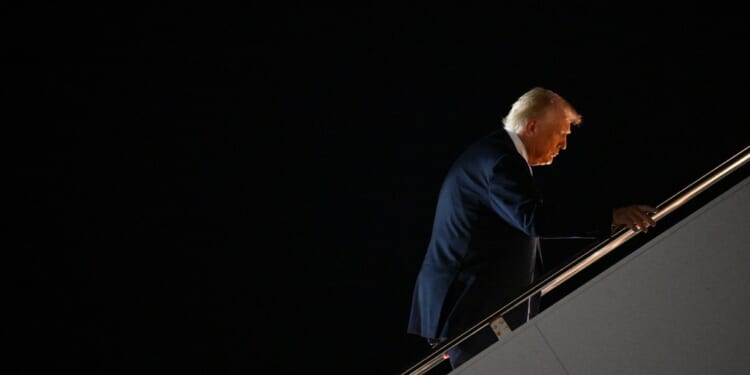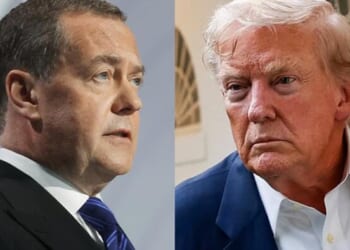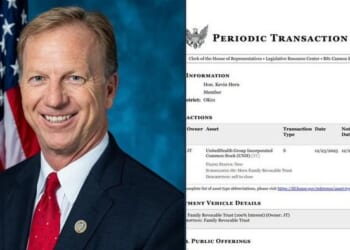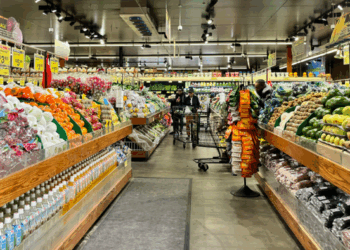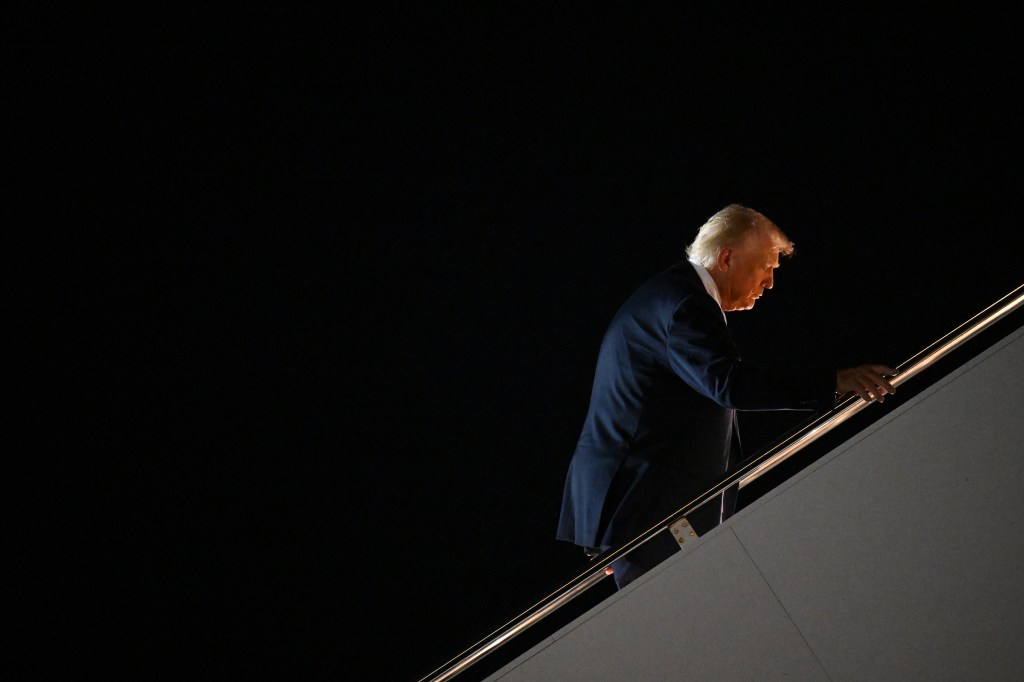
Four mistakes.
Trump’s big tariff mistake is actually four different mistakes, but the most basic one is the most important. He chose to make life more expensive for people whose lives were already too expensive, and he made sure they knew it.
One should never assume too much about what decadent Americans do and don’t understand about policy, but they seem to grasp the fact that tariffs, by design, raise the cost of goods. Last week YouGov polled the question of whether the president’s signature trade policy has increased prices, decreased them, or had no effect. Result: 73 percent said “increased,” including 56 percent of Republicans.
Fox News also conducted a poll last week and came back with one of the most brutal data sets of the Trump era. Seventy-six percent view the economy negatively, more than did so at the end of Joe Biden’s presidency. Disapproval of the president’s job performance stands at 58 percent and has reached all-time highs among men, whites, and non-college voters, three pillars of his base. By a 31-point margin, voters say Trump’s policies have hurt the economy more than helped. His approval on tariffs is 35-63.
And then the dagger: When asked who’s responsible for the state of the economy, 62 percent blame Trump versus 32 percent who blame Biden. Barack Obama went eight years without squandering the slack Americans had cut him initially for the country’s economic problems. Trump blew it in 10 months.
In hindsight, voters may have viewed his “Liberation Day” tariffs back in April as tantamount to the president formally taking political ownership of the economy. Whatever blame Biden might have borne, or might still bear, for the cost of living was washed away by Trump’s unprecedented intervention in global markets. He wanted prices to rise, and they have. He broke the economy. And as the saying goes: If you broke it, you bought it.
His second mistake was imposing tariffs arbitrarily and imperiously. If Trump was bent on asking Americans to sacrifice financially at a moment when they’re already being squeezed by inflation, he needed a consistent nationalist message to justify the sacrifice. Our country urgently needs to rebuild its manufacturing sector, and the only way to incentivize that is to make foreign goods less competitive. America First. I doubt that would have made the policy popular, but it might have drained some of the public resentment around it.
Instead, Trump has treated his possibly illegal tariff authority the same way he treats all executive authority: as leverage to get what he wants or to settle personal scores. At any given moment he might slap a crushing levy on a trade partner because he’s had a spat with its leader or dislikes how its judicial system is treating one of his friends or feels aggrieved by a television advertisement originating in that country that criticized him. The business that you, the average American, have spent your adult life building could be ruined at any given moment, not because sacrifices must be made to restore American greatness, but because the president is a petty authoritarian on a perpetual power trip who woke up in a bad mood. And isn’t trying to hide it.
People are a little annoyed, go figure.
Up off the mat.
The third mistake is that the president hasn’t seemed to care very much that his “America First” trade policy isn’t working out so well for America on the ground. The U.S. manufacturing sector that was supposed to be revived by tariffs is instead being consumed by them. Consumer confidence is at its lowest point since 2022 and unemployment at its highest since 2021, in no small part due to manufacturing layoffs that followed “Liberation Day.” The Trump-loving farmers of heartland America are hurting so badly from soaring costs and retaliatory foreign tariffs that some might need a federal bailout to stay afloat.
And the little guy, whom the president is supposedly looking out for? He’s getting jammed too.
As the pain mounted during the summer and fall, the president occupied himself with foreign policy, White House renovations, and occasional galas at Mar-a-Lago. At one point earlier this year, while he monetized his office to the tune of billions of dollars, he told people feeling the pinch from higher prices that their daughters should learn to make do with two dolls instead of 30. Late last month an NBC News poll found 65 percent believed Trump wasn’t doing enough for the middle class and 66 percent believed he wasn’t doing enough on inflation and the cost of living.
Not until his party was obliterated in elections earlier this month did the president scramble to mitigate some of the sticker shock Americans are feeling, including rolling back tariffs on staples like beef and coffee. But that reprieve exposes the folly of the policy: If making America great again requires foreign goods to be more expensive, why are tariffs now being lifted on certain goods? If making America great again doesn’t require certain goods to be more expensive, why were tariffs imposed on them in the first place?
That brings us to the fourth mistake, and the most politically consequential. By squandering his and his party’s advantage on affordability, Trump has helped Democrats up off of the electoral mat.
Last year’s presidential victory proved that a lot of working-class people, many of them nonwhite, are willing to vote Republican if they think the GOP will address the cost of living more effectively than Democrats. Kamala Harris was burdened not only by the inflationary record of the administration in which she served but by perceptions that her party prioritized progressive cultural obsessions over kitchen-table issues. Trump capitalized and crushed her on Election Day among the 68 percent of voters who said economic conditions were “not so good” or “poor.”
That had the makings of a momentous political realignment. If Republicans had used their new advantage in Washington to act aggressively on reducing the cost of living upon taking power, the partisan allegiances of the blue-collar majority of American voters might have shifted durably.
But Republicans didn’t, and early indications are that those allegiances won’t. Trump-supporting Latino voters swung back hard toward the opposition in this month’s elections. Voters’ trust on which party would do better at making things more affordable has also moved sharply to the left in polling, with Fox News’ survey finding a 10-point advantage for Democrats on which party has a better plan to address the issue. Not surprisingly, the Democratic lead on the generic ballot has also increased across multiple polls this month. They’re surely not ahead by 14 points, as Marist now has it, but the odds of a midterm drubbing are much higher than they were even three months ago.
A party that seemed fatally out of touch on affordability a year ago has regained enough relative credibility on the issue with voters to have run hard on it and blown the doors off in statewide elections this month. It’s hard to believe that would have happened if the president hadn’t created an opening for Democrats by spending nine months immolating his own economic credibility with tariffs. In less than a year, we might look back on that as one of the most consequential political mistakes in modern American history.
Two defenses.
There are two things one might say here in Trump’s defense.
First, it’s possible that trade policy isn’t why most voters are already blaming the president, not his predecessor, for the state of the economy. They’re not chiefly mad about the tariffs, perhaps, they’re mad that he sold them a bill of goods with his magical “I alone can fix it” Superman bombast. From the beginning of his political career, Trump’s pitch to voters has been that he can solve any hard problem that bedevils weak-willed law-abiding weenies by imposing his indomitable strongman will on it. Dumb Americans smarting from inflation were seduced by that and convinced themselves that the same Midas touch that produced a roaring economy in 2019 would somehow magically lower the price of eggs.
I do think there’s something to that. Even if Trump had never imposed tariffs, a persistently high cost of living probably would have led voters to blame him for the poor economy sooner than they blamed Obama. If you sell yourself as a magician, voters expect magic. Fast.
The problem with that defense, though, is that Trump explicitly attributed his alleged magic to … tariffs. They were his One Neat Trick to prosperity, the cure for economic cancer and everything else, the thing that would restore the economy of six years ago if only Americans put him back in charge. So they did. And he ordered the tariffs. And now everything is worse.
For the average joe, the conclusion is inescapable: He doesn’t know what he’s doing. He’s not a magician after all. Americans were suckered and now they’re stuck with him. They’ve been conned and now they know it, and they’re mad.
Which brings us to the second defense, that Americans voted for this. If they hated protectionist trade policy so much, they wouldn’t have elected a guy who chattered manically about tariffs throughout the 2024 campaign.
To which I reply: Sure they would. We’re talking about Americans here.
Barack Obama told everyone who’d listen in 2008 that, if elected, he and his party would reform health insurance with an eye to universal coverage, including for those with preexisting conditions. He won, and kept his promise. And Americans hated it (initially), enough so that they ended up handing the House back to Republicans in 2010 by landslide margins.
Sometimes voters don’t form strong feelings about a policy proposal until they’re forced to live with it and the downsides become clear. That’s a major problem for Trump right now with tariffs, not coincidentally.
Or maybe voters misunderstood the president’s intentions, a chronic problem with a guy whose own supporters say should be taken seriously, not literally. When candidate Trump spoke of “mass deportation,” did he mean mass deportation—or mass deportation of convicted criminals? When candidate Trump spoke of using tariffs to bring jobs back to America, did he mean targeted tariffs on China—or tariffs on everyone under the sun, as his whims dictate?
Even if voters understood and supported his plan for a global trade war, however, it’d be fair for them to expect that he might change his plans depending on economic circumstances. Surely, if inflation continued to bite in 2025, he’d postpone “Liberation Day” until the high cost of living eased and Americans were better prepared to endure the financial pain that tariffs would inflict.
Nope, it turns out. Trump looked at the affordability crisis staring him in the face and said, “Full speed ahead.”
The ideologue.
That’s the great irony of the mess he’s made for himself. A president who isn’t very ideological, who typically thinks only in the short term, and who’s enamored with cheesy policy gimmicks to goose his support decided to go full visionary ideologue on tariffs. He insisted on proceeding with a solution to outsourcing that can only work long term, if it works at all, and had every reason to know it would make Americans who are already being squeezed by prices angry at him.
He’s so ideological about this, in fact, that I expect him to double down on tariffs even if the Supreme Court strikes down his authority under the statute he’s currently using to impose them. Every Republican in Washington will beg him to accept that ruling as a political godsend that will lower prices without him having to lose face by rescinding the tariffs himself, but he won’t do it. I’d bet an internal organ, maybe two, that he’ll reimpose whatever levies he can under other statutes that grant the president certain power over tariffs.
Imagine how Americans will react to that. If you think they hate the policy now, wait until they’re liberated from it by the courts—only to have Trump toss them right back into the economic dungeon. Even his fans might support him only halfheartedly in that case, as they’re not crazy about tariffs themselves and surely understand the deepening peril of their party being on the wrong side of affordability issues.
Rather than rescind the tariffs, my guess is that the president will try to manage the high cost of living the way he copes with most inconvenient information: by suppressing it as best he can and demanding that Americans adopt his own version of reality. I almost can’t blame him if he does, as no one in U.S. history has a better track record at convincing supporters to believe him over their lying eyes. But it’s not just their eyes that need to lie to them this time; it’s their bankbooks, and bankbooks are remorselessly truthful.
His ideological attachment to tariffs is going to lead him and his party to political ruin, with the president growing more irascible, demagogic, and unpredictable as it does. Someone else always pays for Trump’s mistakes. This will be no exception.

